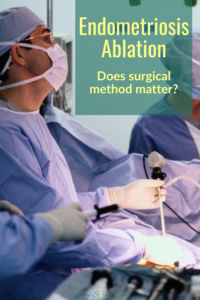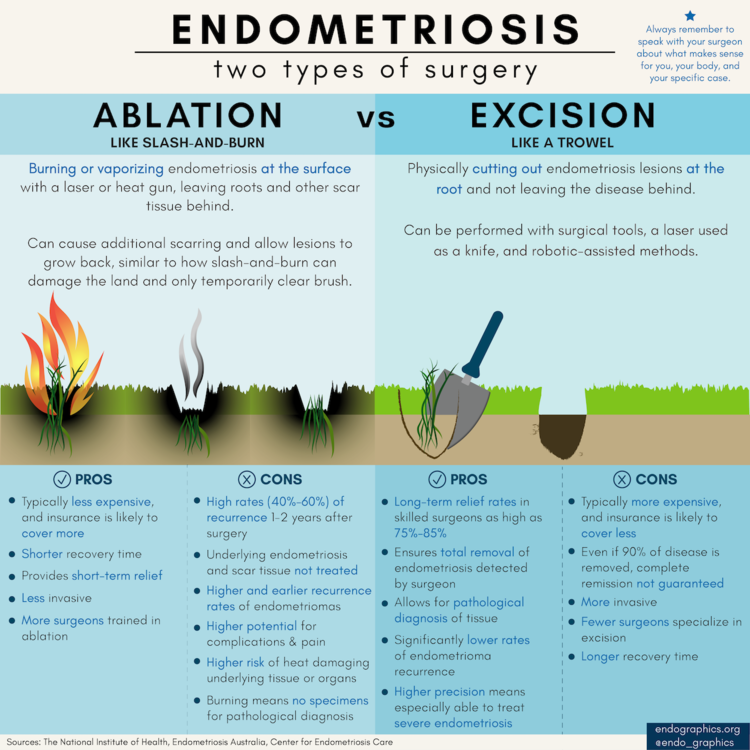Since receiving my endometriosis diagnosis in November of 2017, I have researched, educated, and advocated for better and proper endometriosis care. This, of course, stems from the fact that my first surgery was unsuccessful and significantly worsened my pain and symptoms. It wasn’t until a year after my first surgery that I realized that I did not receive the gold standard in endometriosis care: Laparoscopic Excision by an expert excision specialist. Instead, I received the more utilized technique commonly referred to as endometriosis ablation, but also known as fulguration or cauterization. So today I will answer the question . . . Does surgical method really matter?
Does Surgical Method Really Matter?
Endometriosis Excision vs. Endometriosis Ablation
Endometriosis Excision
Because endometriosis is incurable, symptom control and improved quality of life remains the goal for endometriosis warriors. Currently, the gold standard to proper diagnosis and treatment is laparoscopic excision surgery.

Laparoscopic excision (LAPEX) surgery is a key-hole surgery that involves the use of a heat energy to cut out the endometriosis tissue, including the tissue below the surface. This method is the gold standard because its goal is to remove all endometriosis lesions, while supporting organ function and avoiding destruction of the surrounding healthy cells. It also allows for the excised tissue to be sent to pathology for confirmation of endometriosis.
The biggest benefit to LAPEX is that it gives patient the best chance for remission, as it provides “long-term relief in 75-85% of [endometriosis] patients (1).”
Unfortunately, few surgeons are trained in excision of endometriosis. To date, physicians are being taught outdated methods, treatments, and theories when it comes to endometriosis. This leads to years of misdiagnosis and suffering for those of us living with the disease.
Endometriosis Ablation
Instead of referring patients to excision specialist, many Ob-Gyn’s continue to use laparoscopic ablation to treat endometriosis. This approach means that they burn the superficial tissue to kill the cells, which leaves no possibility for pathologists to confirm endometriosis. This method can lead to damage of the surrounding tissue and it often leaves behind deep implanted endometriosis lesions that is not visible on the surface.
Yes, ablation is often used in all surgeries (to stop bleeding), but it’s important that the surgeon not use it as a means for endometriosis removal. Because, in the end, the patient will likely have worse pain than before the ablation surgery (something I know about all too well).
Below is a perfect infographic from endographics.org, showing the differences between endometriosis excision and ablation, as well as the Pros and Cons of each.
What about Laser Surgery?
Many surgeons advertise that they do endometriosis excision and emphasize their skill in robotic laser surgery. But it is soooo important that you recognize that the laser is only the tool, and not a sign that they are a skilled excision specialist.
The laser is the tool, but the method in which the tool is used is what matters. The laser can be used to excise, or it can be used to ablate endometriosis. So, it is really important that you interview your surgeon and find out what method they use.
The most common type of laser used for excision is a CO2 laser, but this type of laser can be used for ablation as well. So, again, ask your surgeon what type of laser they use and how they use it.
Even more so, “It is important to understand that [the] tool and method are not nearly as important as [the] skill of the surgeon: if he or she cannot excise, they cannot excise using any method or tool (1).”
Surgical Method and Experience
"Having simply performed a fellowship in MIGS is not enough. That is the first step. But it will take another 5-10 years of practice for most since they do not only do endo, to get the needed skill, volume, and experience to be able to handle all forms of endo."
Dr. Ken Sinervo, MD, MSC, FRCSC, SCGE, Center for Endometriosis Care Medical Director
Even after confirming that a surgeon does excision surgery, it is important to continue vetting them. Because the fact is, it takes years for a surgeon to become skilled in excision. Additionally, many surgeons have not been professionally trained to recognize endometriosis by its many visual cues.
Many Ob-Gyns are only trained in recognizing endometriosis that looks like white or brown patches. But according to Dr. Andrew Cook of Vital Health Endometriosis, there are 5 subtle appearances of endometriosis (3). And, unfortunately, most Ob-Gyn’s are not well versed in these varied appearances, which means that endometriosis can often go missed and left behind during surgery.
View this post on InstagramA post shared by Dr. Andrew Cook | Vital Health (@vitalhealthendometriosis) on
That being said, it is very important to find an endometriosis excision expert who you are comfortable with and that can answer the following questions (from endogirlsblog):
- Have you done a fellowship in minimally invasive surgery?
- If yes: For how long and where?
- Have you trained at a center that specializes in endometriosis and advanced gynecological surgery?
- Do you have a multidisciplinary team in place to deal with extra pelvic endometriosis?
- NOTE: It’s best to have an endo excision surgeon who works with other specialists to address endometriosis that is found on other organs. For example, you would want a Gastroenterologist working with your surgeon if there is concern for deep infiltrating endo on the bowel. Or a Cardiothoracic surgeon, if there is concern for thoracic or diaphragmatic endometriosis. Of course, these multidisciplinary specialists should also be familiar with extra-pelvic endometriosis.
- How many cases of endometriosis do you do per year?
- NOTE: Many experts in endo excision work solely with endometriosis and or other pelvic pain conditions. This means they may address an average of about 150-200 cases of endo a year. Unfortunately, it is almost impossible for a general Ob-Gyn to see this many cases, as most of their time is spent delivering babies.
- Do you perform excision or ablation?
- What are your recurrence rates?
The Best Resource for Finding A Skilled Excision Specialist
Yourself
For several years I have led people to the many online lists of skilled surgeons who have been vetted by various groups and online platforms. Though these lists can be valuable, I have found that the best way to find expert care is to educate yourself on what makes a surgeon a true expert.
To help you navigate the learning, I have written a blog post that will help you understand the questions to ask a surgeon and what to look for in their answers.
>>>>All the Questions to Ask Your Endometriosis Specialist<<<<<
An additional and AMAZING resource is the My Illness Will Not Win community founded by Rosemarie Philip. Rosemarie is a Professional Certified Coach and advocate in the endometriosis community. She is an endometriosis, PCOS, adenomyosis, and Raynaud’s warrior. She has put together a FREE and comprehensive endometriosis course in collaboration with some of the most admired advocates in our community. This is truly the only course that I fully endorse without reservations. I recommend joining her free community for access to the endo course, but I also highly recommend her paid community, which has given me so much in personal health journey. She even has an option to apply for a reduce rate because she get’s that chronic illness can be financially taxing. You can learn more about the My Illness Will Not Win Community HERE.
Limited Specialists
The reality is that there are not enough endometriosis excision specialists in the world and there are many areas that leave patients with no local options. This is a systemic problem that will take years to change, but efforts are being made every day by so many people.
So, even if a local gynecologist is not listed on any online community or platform, educating yourself will give you the ability to advocate for the best care options available to you.
So, Does Surgical Method Really Matter?
Yes. Absolutely yes. If your Ob-Gyn is recommending endometriosis ablation to treat your symptoms, then that is a red flag telling you to continue looking for a skilled expert excision. Because in the end, expert excision is your best chance at having long term relief, improved quality of life, and lowered risk of endometrioma recurrence.
However, excision is NOT a cure and it DOES NOT guarantee relief from pain. Still, it remains the GOLD STANDARD in endometriosis care.


- Excision of Endometriosis (2020). Center for Endometriosis Care. Retrieved from http://centerforendo.com/lapex-laparoscopic-excision-of-endometriosis
- What does it all mean? Excision, ablation and robotic assistance for removal of endometriosis – Tool (2016). Endometriosis Australia. Retrieved from https://www.endometriosisaustralia.org/post/2016/09/19/what-does-it-all-mean-excision-ablation-and-robotic-assistance-for-removal-of-endometrios?fbclid=IwAR3XlXWU3LqSq9_dMQTag19LAq7KUrXrxHhlOENTXrq5pGYetR_2t7Rotac
- Vital Health Endometriosis [@vitalhealthendometriosis] (2019, October 7). Can You Identify Endo? [Instagram Video]. Retrieved from https://www.instagram.com/tv/B3U9PRRAB4y/?utm_source=ig_web_copy_link
- Boyce, K. (2019). Must Ask Questions For Your Surgeon. Retrieved from https://endogirlblog.com/surgeonquestions/




